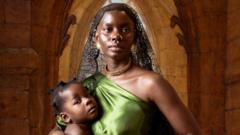In the world of Dola Posh, multiple identities come into play: photographer, Nigerian, Briton, and mother. However, following the birth of her daughter, she felt lost amid her roles. Six days post-delivery, Dola found herself in an English hospital during a COVID lockdown, grappling with the overwhelming changes in her life as she pondered her future in photography. The physical distance from her mother in Lagos compounded her feelings of isolation, leading her to a dark mindset where she questioned her identity as a mother.
Postnatal depression often manifests as a loss of self, a phenomenon particularly pronounced among black women. Despite not recognizing it at the time, Dola was navigating its turbulent waters. Once discharged, facing unsolicited advice and parenting pressure worsened her mental state. The noise of expectations drowned out her voice, leaving her feeling inadequate and confused about her new role.
Dola vividly recalls nights spent in despair, one occasion leading her to contemplate suicide. Clinging to her blanket for comfort, Dola resorted to reaching out to her health visitor, who advised her to embrace therapy. It was during this process that Dola rediscovered her love for photography as a tool for healing.
Her art began to flourish as she turned the lens on herself and her daughter, Monioluwa—her name signifying divinity in Yoruba. Initially unaware of the connections her work had to traditional representations of motherhood, a mentor highlighted the unconscious impact of her upbringing on her photography style.
The images of Dola posing with Monioluwa echoed the Madonna and child motif prevalent in Western art, a reflection of her familial background steeped in religion. These representations became a medium for Dola to process her emotions and reclaim her identity.
As she embraced her narrative of motherhood rife with struggles, Dola found the power in vulnerability. Sharing her experiences with postnatal depression allowed her to break the stigma associated with mental health issues, especially within black communities. Encouraged by winning a Leica award, Dola is determined to continue her artistic journey while inspiring fellow mothers to speak out.
Her mission is clear: she advocates for visibility, wanting black mothers to see themselves represented in the media discussing their challenges candidly. In the UK, statistics show black women face higher rates of postnatal depression, an issue Dola believes must be addressed through openness.
As she learns to navigate motherhood while pursuing her passion, Dola stands firm in asserting, "I am still an artist. I am still a woman. And I have something to say."
For anyone touched by similar struggles, the NHS offers useful resources, and organizations like the BBC can provide support and information on mental health matters.
Postnatal depression often manifests as a loss of self, a phenomenon particularly pronounced among black women. Despite not recognizing it at the time, Dola was navigating its turbulent waters. Once discharged, facing unsolicited advice and parenting pressure worsened her mental state. The noise of expectations drowned out her voice, leaving her feeling inadequate and confused about her new role.
Dola vividly recalls nights spent in despair, one occasion leading her to contemplate suicide. Clinging to her blanket for comfort, Dola resorted to reaching out to her health visitor, who advised her to embrace therapy. It was during this process that Dola rediscovered her love for photography as a tool for healing.
Her art began to flourish as she turned the lens on herself and her daughter, Monioluwa—her name signifying divinity in Yoruba. Initially unaware of the connections her work had to traditional representations of motherhood, a mentor highlighted the unconscious impact of her upbringing on her photography style.
The images of Dola posing with Monioluwa echoed the Madonna and child motif prevalent in Western art, a reflection of her familial background steeped in religion. These representations became a medium for Dola to process her emotions and reclaim her identity.
As she embraced her narrative of motherhood rife with struggles, Dola found the power in vulnerability. Sharing her experiences with postnatal depression allowed her to break the stigma associated with mental health issues, especially within black communities. Encouraged by winning a Leica award, Dola is determined to continue her artistic journey while inspiring fellow mothers to speak out.
Her mission is clear: she advocates for visibility, wanting black mothers to see themselves represented in the media discussing their challenges candidly. In the UK, statistics show black women face higher rates of postnatal depression, an issue Dola believes must be addressed through openness.
As she learns to navigate motherhood while pursuing her passion, Dola stands firm in asserting, "I am still an artist. I am still a woman. And I have something to say."
For anyone touched by similar struggles, the NHS offers useful resources, and organizations like the BBC can provide support and information on mental health matters.




















